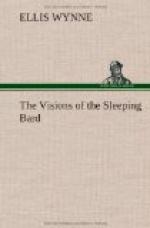{28a} Corruption of the best.—A Welsh adage; v. Myv. Arch. III. 185.
{28b} Some mocking.—Compare Bunyan’s Christian starting from the City of Destruction: “So he looked not behind him, but fled towards the middle of the plain. The neighbours came out to see him run, and as he ran, some mocked, others threatened and some cried after him to return.”
{29a} Who is content.—Cp.
Qui fit, Maecenas, ut nemo, quam sibi sortem
Seu ratio dederit seu fors obiecerit, illa
Contentus vivat, laudet diversa sequentes?
—Horace: Sat. I. i.
{34a} Increases his own penalty.—Cp.
—the will
And high permission of all-ruling heaven
Left him at large to his own dark designs,
That with reiterated crimes he might
Heap on himself damnation, while he sought
Evil to others.
- Par. Lost: I. 211-6.
{36a} Royal blood—referring to the execution of Charles I.
{37a} The Pope and his other son.—The concluding lines of this Vision were evidently written amidst the rejoicings of the nation at the victories of Marlborough over the French and of Charles XII. over the Muscovites
{43a} Glyn Cywarch.—The ancestral home of the Author’s father, situate in a lonely glen about three miles from Harlech.
{43b} Our brother Death.—This idea of the kinship of Death and Sleep is common to all poets, ancient and modern; cp. the “Consanguineus Leti Sopor” of Vergil (AEneid: VI. 278); and also:
Oh thou God of Quiet!
Look like thy brother, Death, so still,—so
stirless —
For then we are happiest, as it may be, we
Are happiest of all within the realm
Of thy stern, silent, and unawakening twin.
- Byron: Sardanapulus, IV.
{44a} An extensive domain.—Compare what follows with Vergil’s description (Dryden’s trans.):
Just in the gate and in the jaws of Hell,
Revengeful cares and sullen sorrows dwell,
And pale diseases and repining age —
Want, fear, and famine’s unresisted rage;
Here toils and death, and death’s half-brother,
Sleep,
Forms terrible to view, their sentry keep.
—AEneid: VI. 273-8
{48a} Merlin.—A bard or seer who is supposed to have flourished about the middle of the fifth century, when Arthur was king. He figures largely in early tales and traditions, and many of his prophecies are to be found in later Cymric poetry, to one of which Tennyson refers in his Morte d’Arthur:
I think that we
Shall never more, at any future time,
Delight our souls with talks of knightly deeds
Walking about the gardens and the halls
Of Camelot, as in the days that were.
I perish by this people which I made —
Though Merlin sware that I should come again
To rule once more—but let what will be,
be.
{48b} Brutus, the son of Silvius.—According to the Chronicles of the Welsh Kings, Brwth (Brutus) was the son of Selys (Silvius), the son of Einion or AEneas who, tradition tells, was the first king of Prydain. In these ancient chronicles we find many tales recorded of Brutus and his renowned ancestors down to the fall of Troy and even earlier.




